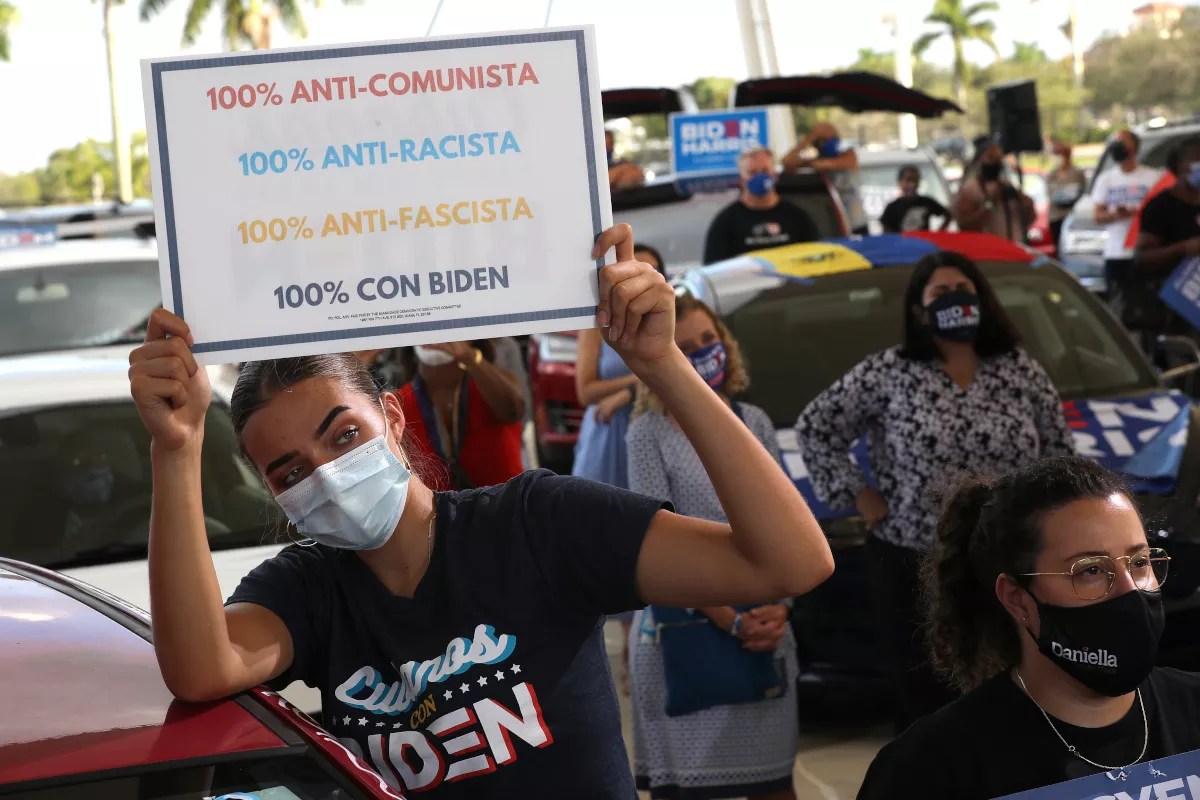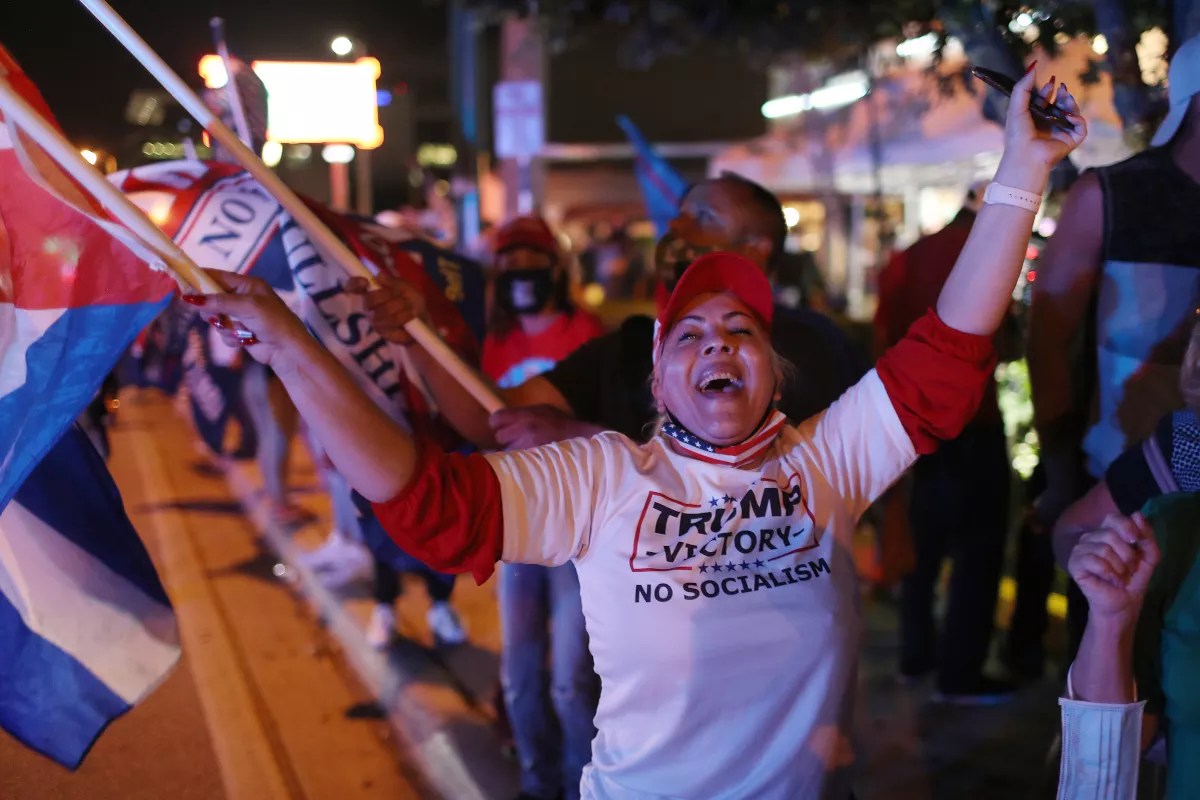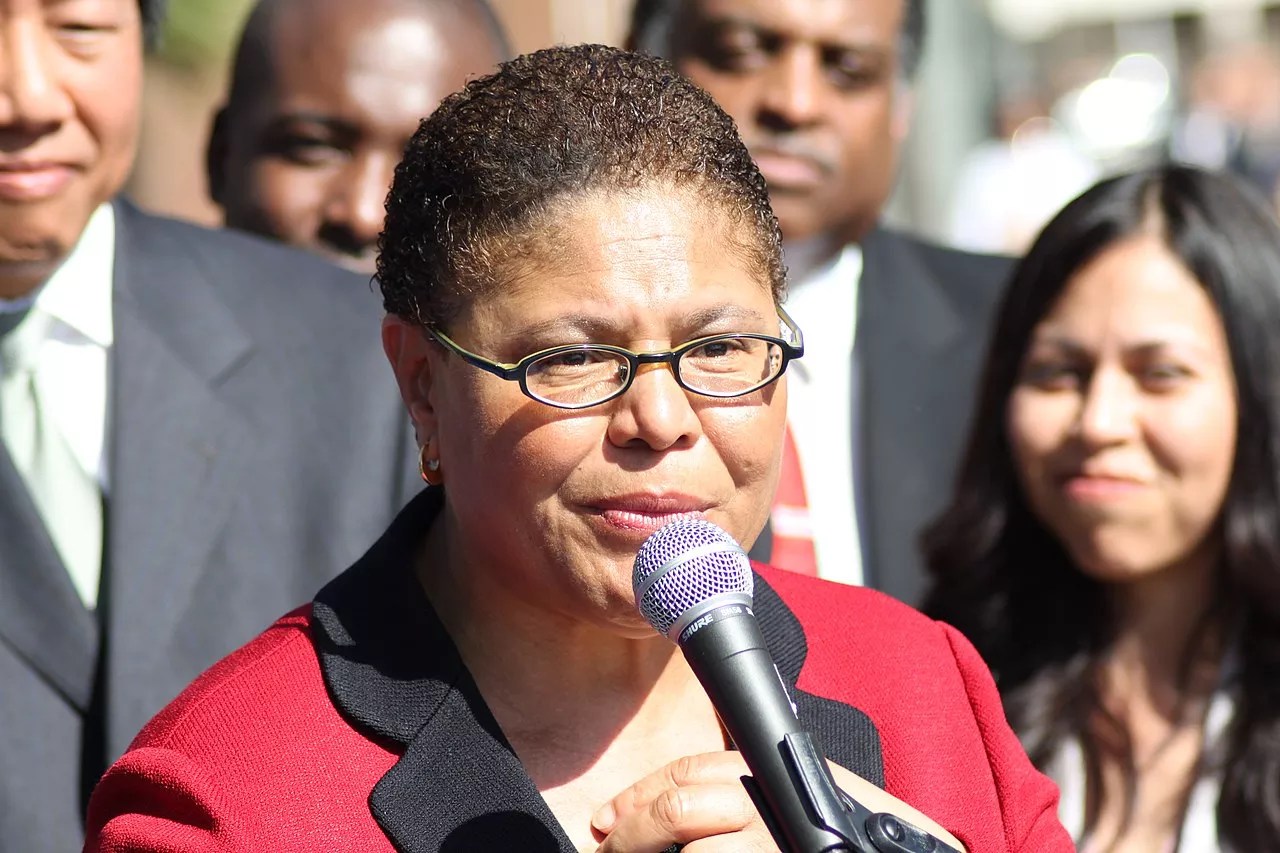

Audio By Carbonatix
Let’s get this out of the way first: I am a Cuban-American who proudly voted for Joe Biden. I spent all of November 7 celebrating after I heard the news of his win. And yet I can understand why many Cuban-Americans voted for Donald Trump.
Given how many social-media memes, TV/cable/streaming networks, and people I know (including young Cuban-Americans) are attacking Cuban-Americans as a group for the way they cast their votes, I think it’s important for me to explain that while I absolutely do not align with pro-Trump Cuban voters, I believe that trying to understand that phenomenon instead of simply attacking it is crucial to the survival of our democracy and the promise of democracy in Cuba.
Any change in Cuba must come from within, but we need to be ready to support that change. This means Cuban-Americans must present a united front. We cannot allow U.S. elections to divide us in the way the Cuban regime has. Generationally and across migrational waves, we need to come together because of, not in spite of, our differences.
My parents and grandparents arrived in the United States in the early 1960s, having escaped the Castro regime. My stepdad arrived later, after then-President Jimmy Carter helped release his father, who by then had served 15 years as a political prisoner.
Since 1959, by very conservative estimates, 78,000 Cubans have died trying to escape the Castro brothers’ regime. At least 10,723 people have been directly killed by the regime. Half of them died by extrajudicial firing squad after Che Guevara eliminated trials, calling them a “bourgeois detail.” At least 22 were children. These are extremely conservative estimates from 2016, because the regime is not transparent. Simply put: It lies, blatantly.
Many Americans were shocked that Cubans could vote for Trump, who also lies blatantly, who showed all the markings of a dictator, a sort of modern-day hybrid of Fidel and Fulgencio Batista, the puppet dictator Fidel overthrew.
How could Cuban-Americans, then, side with someone who, if allowed, would rupture our own U.S. Constitution? Who aligned himself with Vladimir Putin, a former officer of the KGB – the very same organization that fed the system of state surveillance that exists in Cuba to this day? How could they accept Trump’s “jokes” about serving more than two terms, or his clinging – even now – to power?
It’s crazy, right?
It’s not crazy
That’s the thing. It’s not crazy. It could be called trauma. But that’d be dangerous too, because in the wrong hands, it’s another way of saying “crazy.” And the more you call it crazy, the more memory oozes from the open wound of Cuban experience – an experience few know or recognize – to rear its angry head.
As a writer, I know this firsthand. How many times has a non-Cuban editor received a novel, article, or narrative of mine and told me the Cuba I write about doesn’t sound like the Cuba they know? The fact is, the Cuba that people think they know and the real Cuba are two vastly different things. And the longer that divide exists, the longer people will misunderstand the Cuban vote. It’s not enough to throw a superficially Cuban or Latino story out in the world for the sake of “representation” and call it a day. It’s a false listen. It’s the kind of listen you do when you’re talking to your spouse or parents while playing Sudoku on your phone.
The Republicans have, for good or bad, been listening much more carefully than the Dems. With knowledge of the Cuban story, the GOP pandered, pushed buttons, and pretended to rub a healing balm in the wound of the Cuban experience when it was really a corrosive salt that made the Cubans jump and react. The Trump campaign used Cuban-American and Latin-American pain to its advantage. Thankfully, Trump lost anyway. Thankfully, because our democracy has survived for over 200 years, many voters knew better, including many Cuban-American voters.
That doesn’t mean we can relax now.
As Van Jones explained on CNN on November 4, “The Latino, Latina community [feels] overgeneralization, underrepresentation, and underinvestment” on the part of Democrats. “We gotta stop acting like all Latinos and Latinas are the same people. A Cuban is not the same as a Puerto Rican, is not the same as a Guatemalan,” Jones said.
It’s not about sipping a Cuban colada on social media or slapping a Colombian cap on Biden’s head at the last minute. It’s about first understanding and then combating the kind of micro-targeting (more often than not with misinformation) the Trump campaign was up to.
When your experience is one of great pain and you are trying to warn the world about it and people laugh, it’s problematic. When you’ve escaped a regime that has slaughtered your family and continues to trap and silence its people, you’re likely to move away from those who ridicule you when you warn that tyranny can happen anywhere. (It can, by the way. Just ask Venezuelans. Or Nicaraguans, who live under Daniel Ortega, the once-communist leader who trained under Fidel Castro in the 1970s, who has now turned evangelical, instating policies such as the absolute prohibition of abortion even if a woman’s life is at risk.)
Some say Cuban-Americans, like many others who’ve fled their homeland for political reasons, are in an abusive relationship with the dictatorial regime of their motherland. Republicans, for a long time, have been responding with: “I understand you and where you come from.”
Republicans have been calling the Castros dictators outright; censuring Chavez and Maduro for their atrocities. Cubans have been waiting to hear that word from the mouths of Democrats regarding Castro for a long time: dictator. Instead, they often hear romanticized references – like “fiery apostle,” the term the New York Times employed in its 2016 obituary when Castro died at age 90. In the minds of some Cubans, this question stands: How can you call Trump a tyrant but not Fidel or Raúl?
The problem, of course, is that it’s not one or the other – it’s both. Trump is cut from the same cloth as the Castros and the Ortegas and the Maduros and Chavezes of the world. He and his enablers stoke the fires of those they need to employ at whatever juncture, in order to remain in power.

Trump supporters cheer outside Versailles restaurant in Little Havana on election night 2020.
Photo by Joe Raedle/Getty Images
And so, after stoking the Cuban-American vote, it was hardly a surprise when local news reported that “about 50 Western Miami-Dade precincts each showed more than 70 percent of voters supported Trump.”
The demographics of West Miami-Dade are very much Cuban-American, but also, interestingly (particularly in Kendall), Colombian-American, the third-largest Latino community in Florida.
Colombian-Americans are not discussed as much as Cuban-Americans are in terms of U.S. elections. And yet they mattered this year. Trump wooed the Colombian vote by mobilizing in Miami and aligning himself with the former president of Colombia, Alvaro Uribe, leaning into fears that the country could fall to the authoritarian regimes that swallowed its neighbors.
Republicans won in Florida. Cuban-Americans, Venezuelan-Americans, and Colombian-Americans voted, and Trump took our southernmost state. But he did not win the election.
The dissonance that is democracy
So now what?
First, those Cuban-Americans still hanging onto Trump must let go and allow democracy to do what democracy does. Biden won. Trump must go. Period.
The left must do its part, too.
Two days after the election, a a meme began popping up on social media – one example of many along similar lines. It featured Selena, the beloved Tejana singer who was murdered by Yolanda Saldivar, a fellow Mexican-American who ran her fan club. The meme labels an image of a regal Selena “Latinos in the U.S.” and her short, stout assassin “Cuban-Americans in Florida.”
The people sharing this kind of attack meme (there are plenty) right now are not Trump supporters. Many are left of liberal, and woke. The danger of Wokeism is that it often feels a lot like Trumpism. It can be just as insular and parochial through its cancel culture.
If we are truly going to heal as a country and understand places like Miami, then the attacks are going to have to stop on both sides. The open racist attacks committed by Trumpers, post-Trump – that is clear. But also, the more veiled but equally dangerous attacks from the left, which blossom from a similar seed of intolerance.
Left and right alike must start to welcome the dissonance that is democracy.
F. Scott Fitzgerald is famous for saying that “the test of a first-rate intelligence is the ability to hold two opposing ideas in the mind at the same time, and still retain the ability to function.” If this was a lesson of the 20th Century, then in the 21st we must remember that trying to answer complicated questions with the kinds of slogans, sound bites, and chants that social media is so good at propagating makes us the kind of followers (or “useful idiots”) tyranny needs, whatever tyranny’s disguise.
As Cuban-Americans, we are not excluded from embracing the dissonance. If we want to be listened to, we must also listen to the complicated cacophony within us as Cuban-Americans, as Americans, and as a nation, and resist the urge to immediately organize the mess. No matter how difficult.
It will be during Biden’s term, after all, that we will, potentially, have a Cuban government without a Castro at the helm for the first time in over six decades. Raúl Castro has said he will step down when his term as the nation’s de facto leader when his term as head of the Communist Party expires in April 2021. The Castro “shadow will remain,” as Cuba scholar Andy Gomez observes. But, if Raúl truly steps down, there is also a massive window of opportunity for real change in Cuba that we cannot take lightly.
Cuban-Americans need to engage and exchange with Biden and the Democrats to make the dream of human rights, freedom of speech, the right to vote, and, potentially, democracy in Cuba, a nonpartisan conversation. We cannot look at Biden as a Democrat and say: He won’t do anything, he’ll just do us wrong; he’s a socialist.
He’s not.
What Biden has already told us through his actions is positive and informed. He did not choose Karen Bass, who was under consideration for VP, as his running mate. In the 1970s, Bass had aligned herself with Fidel Castro to the extent of helping build his regime through the Venceremos Brigade. In the words of Miami-based political consultant Fernand Amandi, “[Bass made] Bernie Sanders look like Ronald Reagan.” By distancing himself from Bass, Bernie, Alexandria Ocasio-Cortez, etc.; and naming Alejandro Mayorkas, a Cuban-American, as his choice for Secretary of the Department Homeland Security, Biden is signaling that he is significantly more aligned with Cuban-Americans than the Trump campaign led everyone to believe.

U.S. Rep. Karen Bass campaigning for Congress in California in 2010
Photo by Lord Jim/Wikimedia Commons
Gomez, who has been in contact with Biden’s camp, believes that, as president, Biden will pull back from Trump’s extreme restrictions on Cuba, such as travel and the ability to send money to the island. But of course, those are like “putting a Band-Aid on a 14-inch cut,” he said.
When it comes to bigger issues like human rights – the things Cuba doesn’t want to talk about – Gomez does not think Biden will go the way of former President Barack Obama. Obama was criticized for opening the door to Cuba too wide, without going harder on human rights first. Obama’s intention, as he said in his December 14, 2014 statement on Cuba policy changes, was to allow Americans to be the “best ambassadors for freedom on the island.”
We have since learned, however, that human-rights violations on the island not only continued, but increased, after Obama’s aperture. According to the New York Times, Cuba has the world’s highest incarceration rate – and many of those incarcerations are for “pre-criminal social dangerousness,” a catch-all used to imprison political opponents considered to be a threat to the regime. In 2018, the government also made it outright illegal to make art that was not directly approved by, and which did not serve, the State. Censorship is nothing new to Cuba, but the government has been further exerting its “absolute control” in writing, as the Wall Street Journal reported in 2018.
Obama’s abrupt opening followed by Trump’s abrupt closure is what Cuba as a partisan issue will continue to look like – short-term strategies that are not allowed to see their own end – unless we change that right now. Ironically, the Cuban regime feeds on the democratic pendulum in order to strengthen itself.
On November 27, a group of artists began to gather around the ministry of culture in Havana. They’d had enough. They assembled, at first, to demand the whereabouts of fellow artist Luis Manuel Otero Alcántara and academic Anamely Ramon González, who form part of the San Isidro Movement and who’d been taken from their home alongside other artists the night before and disappeared. Alcántara and González were, in turn, participating in a hunger strike and demanding the release of rapper Denis Solis, who the regime had imprisoned for “contempt” after State police broke into his house to harass him. Soon, the act of solidarity outside the ministry of culture became not just about two people, but about something much bigger: the dissent of hundreds of artists demanding to be peacefully heard – the desire to be released from the absolute control of the government.
Cuba lives inside and outside the island. And for change to come to Cuba we must understand our common history and our common goals. Around the table this holiday season and beyond, we must toss out the “no politics and religion” rule. I’m not saying fight. I’m saying listen. Listen hard and battle the urge to turn or walk away when we hear something we don’t like.
Young Cuban-Americans must educate themselves on the truth of their homeland; it’s far more complicated than we think. Our elders and our ancestors have a great deal to teach us about Cuba’s truths and the regime’s mirages.
In return, the young should be allowed to infuse the table with what it means to have been born in this country, to be American by birth with deep and beautiful Cuban roots. They should be allowed to contribute their ideas toward a new tomorrow, which older generations may have given up on.
True diversity and democracy are messy. The American story stands on the soil of dissent and dissonance. As Americans and Cuban-Americans, it’s our job to do the hard work of hearing it instead of canceling it.